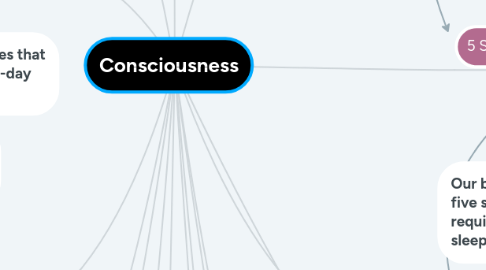Consciousness
by Vithurshaa Sangarapillai


1. What is Consciousness
1.1. Our subjective experience of the world, our bodies, and our mental perspectives
2. Self-Awareness
2.1. Emotional Intelligence makes us great social creatures
2.2. Can bargain with time (sacrifice now and have a better life later)
2.3. Consciousness causes awareness of existence and mortality
2.4. Artificial Intelligence does not know how to replicate self-awareness
2.5. Theory of Mind is understanding your own and others' thoughts and feelings
3. 4 States of Consciousness
3.1. Awake and alert: beta waves (15-30 Hz)
3.2. Daydreaming, calm, and meditation: alpha waves (9-14 Hz)
3.3. Drowsiness and deep relaxation: theta waves (4-8 Hz)
3.4. Deep dreamless sleeping: delta waves (1-3 Hz)
4. Things to do to Beat Insomnia
4.1. Hide clocks
4.2. Sleep in a cool room
4.3. Have a regular sleep schedule
5. Altered States of Consciousness
5.1. Drugs and Hallucinations
5.2. Meditation
5.3. Out-of-body and near-death experiences
5.4. Neurological and psychological disorders
6. Drugs
6.1. Anti-psychotics
6.2. Stimulants
6.3. Depressants
6.4. Hallucinogens
7. Alcohol
7.1. Most used and abused drug
7.2. Is a depressant
7.3. Drinking comes from genetic and environmental factors
7.4. It decreases the release of GABA
7.5. If taken in high doses, it can induce sleep or cause death
8. Cocaine
8.1. A psycho-stimulant
8.2. Increases alertness, decreases fatigue and stimulates sexual arousal
8.3. Blocks dopamine and norepinephrine reuptake channels
8.4. Highly addictive as you build a tolerance
8.5. Tolerance
8.5.1. Progessive insensitivity to repeated use and dosage of the same drug
9. Even though, everyone requires a certain amount of hours of sleep daily, there are some people who have a hard sleeping entirely; however, there are things one can do to help them sleep
10. It is good for people who have insomnia to know what to do to beat it; however, they are things one must also avoid doing too
11. Different conscious states can be induced by drugs, alcohol and cocaine
12. Being conscious helps us be aware of ourselves and others
13. There are 4 conscious states that we experience on a day-to-day basis
14. These conscious states can be altered and affect people mentally and physically
15. More dreams
16. Biology of Sleep
16.1. Circadian rhythm is the cyclical biological changes that happen approximately on a 24-hour basis
16.2. There are changes in hormone release, brain waves, drowsiness, and body temperature
16.3. Melatonin triggers sleep
16.4. Sleep is important for your health, consolidating memories and immune system functioning
17. How Much Sleep?
17.1. Everyone needs 7-10 hours of sleep daily
17.2. If you have a gene mutation called DEC2, then you only need 6 hours
17.3. University and college students need 9 hours of sleep
17.4. Newborns need 16 hours of sleep
18. 5 Stages of Sleeping
18.1. Stage 1 (NREM): Light sleeping, hallucinations, and theta waves
18.2. Stage 2 (NREM): Harder to wake up, sleep spindles and K-Complexes
18.3. Stage 3 and 4 (NREM): Deep sleep, sleep walking and delta waves
18.4. Stage 5 (REM): Pardoxical sleep and dreaming
19. NREM Dreams
19.1. Shorter
19.2. Thought-like
19.3. Repetitive
19.4. Daily/mundane tasks
20. REM Dreams
20.1. Emotional, illogical and nonsensible
20.2. Plot shifts
20.3. Biological crucial
21. Dream Theories
21.1. Psychoanalytical View
21.1.1. Our dreams are symbolic of our unconscious deepest desires
21.2. Cognitive View
21.2.1. There is no hidden meanings in our dreams, it is just a continuation of waking cognitive processes
21.3. Activation Synthesis Theory
21.3.1. Dreams are the brain's attempt to make sense of random neural signals during REM
21.4. Evolutionary View
21.4.1. Dreams allow a person to rehearse situations, so they can deal with it better in real life

